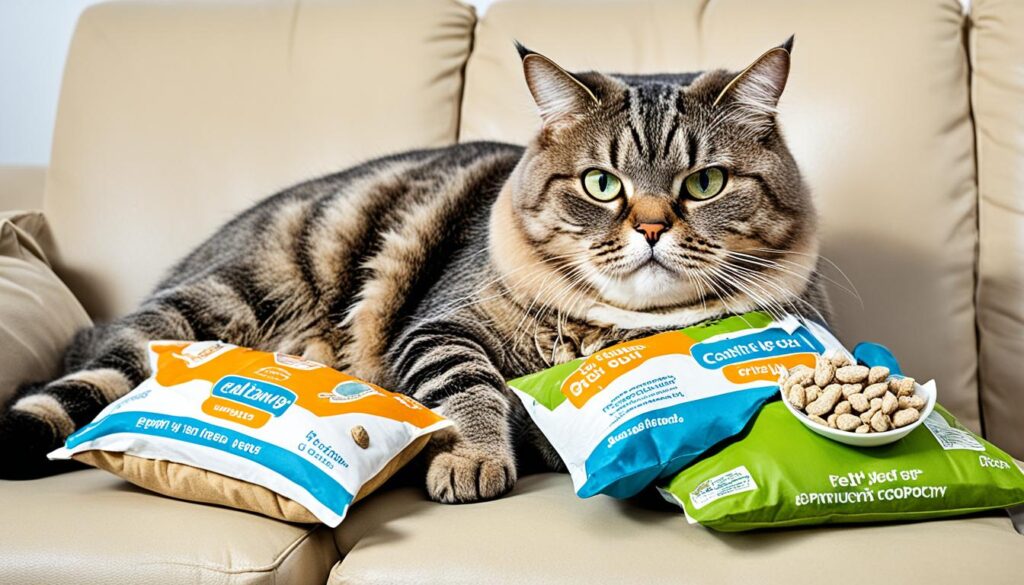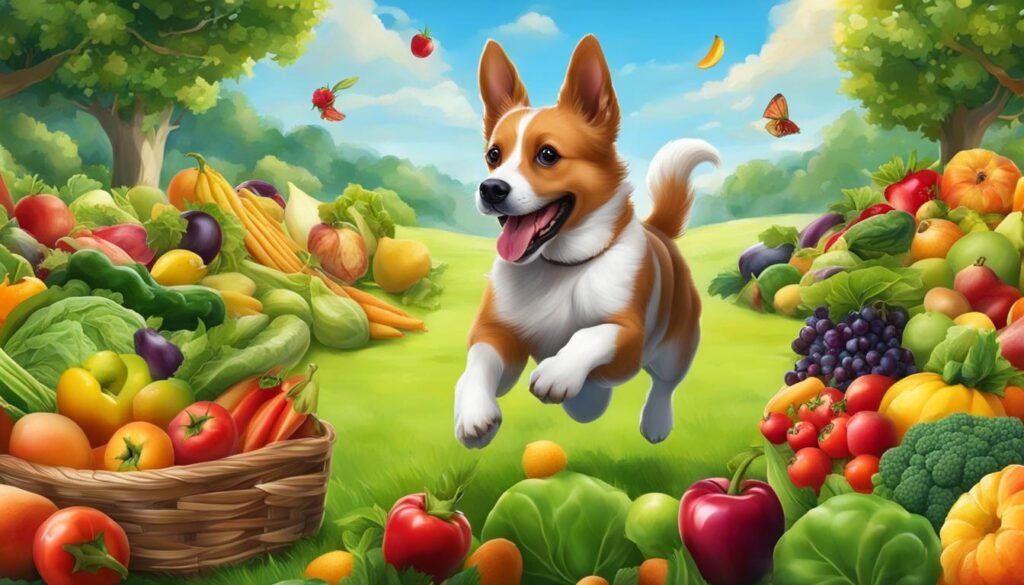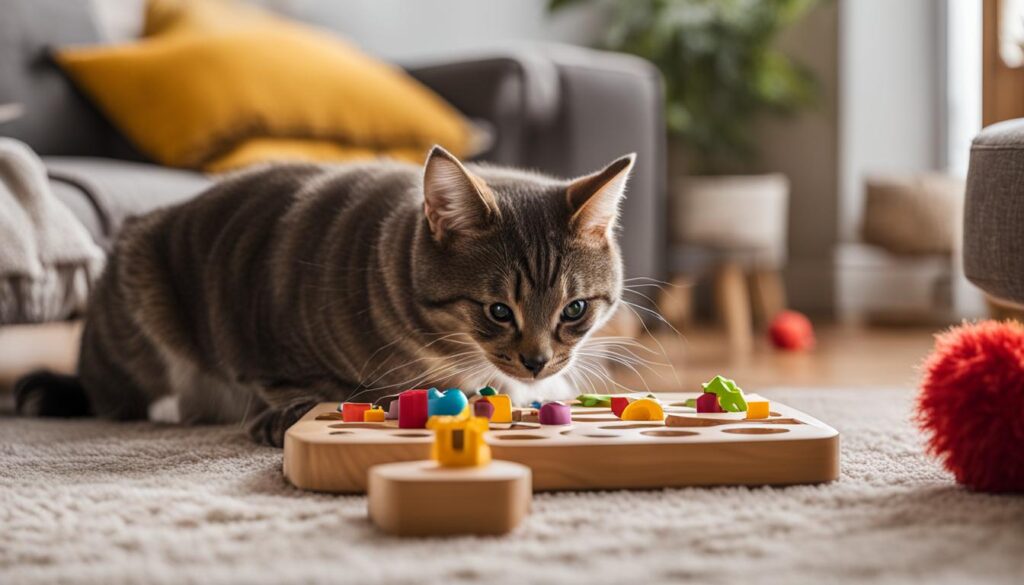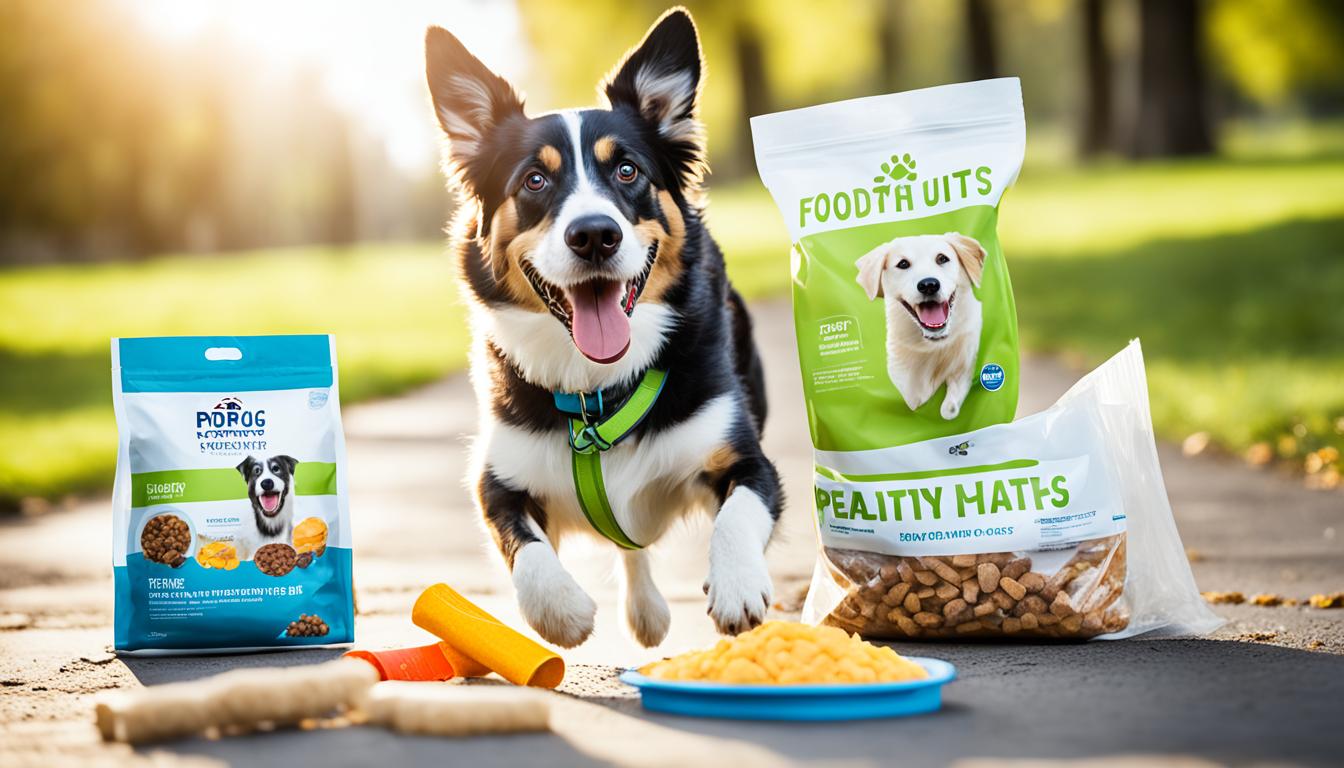Welcome to our comprehensive guide on managing your pet’s weight and ensuring a healthy lifestyle. Taking care of your pet’s weight is crucial for their overall health and well-being. In this article, we will provide you with expert tips and advice on maintaining your pet’s weight and helping them live a vibrant, active life.
Excess weight in pets can lead to various health problems, including arthritis, diabetes, heart disease, and a reduced lifespan. By following the tips and strategies we will discuss, you can prevent these issues and ensure your pet enjoys a long, happy, and healthy life.
Key Takeaways:
- Managing your pet’s weight is essential for their overall health and well-being.
- Excess weight can lead to various health problems and a reduced lifespan.
- By following expert tips and strategies, you can help your pet maintain a healthy weight and live an active life.
- Preventative measures, exercise routines, balanced diets, and mental stimulation are key to managing your pet’s weight.
- Consulting with a veterinarian is crucial for personalized guidance and recommendations.
The Importance of Managing Your Pet’s Weight
Managing your pet’s weight is essential for their overall health and well-being. Excess weight can lead to numerous health problems, including arthritis, diabetes, heart disease, and reduced lifespan. By maintaining a healthy weight, you can help prevent these issues and ensure your pet lives a long, happy, and active life.
In this section, we will discuss why managing your pet’s weight is crucial and the benefits it can provide.
Recognizing Pet Obesity: Risks and Prevention
Pet obesity has become an epidemic, with over 50% of cats and dogs in the United States being overweight or obese. The rise in pet obesity is a growing concern among pet owners and veterinarians alike. It poses significant health risks to our furry companions and can lead to a shorter lifespan and a reduced quality of life.

Understanding the Epidemic of Pet Obesity
The increasing trend in pet obesity can be attributed to various factors, including sedentary lifestyles, overfeeding, and poor nutrition. Modern conveniences and busy schedules often limit the opportunities for pets to engage in physical activities, leading to weight gain.
Health Risks Associated with Overweight Pets
Carrying excess weight puts pets at risk of developing numerous health conditions. Overweight pets are more likely to experience high blood pressure, heart disease, diabetes, arthritis, and certain types of cancer. These conditions can significantly impact their quality of life and require costly medical treatments.
Preventative Measures for Pet Obesity
The good news is that pet obesity is preventable and manageable. By implementing a few simple steps, you can help your pet maintain a healthy weight and reduce the risks associated with obesity.
- Establish a regular exercise routine: Engage in daily physical activities with your pet, such as walks, playtime, or interactive games, to help them burn calories and stay fit.
- Provide a balanced diet: Feed your pet a nutritionally complete and balanced diet based on their specific needs. Avoid excessive treats or table scraps that can contribute to weight gain.
- Monitor portion sizes: Follow feeding guidelines provided by your veterinarian and ensure that you are not overfeeding your pet. Be mindful of portion sizes and adjust accordingly.
- Incorporate mental stimulation: Engage your pet in mentally stimulating activities, such as puzzle toys or interactive feeders, to prevent boredom-related overeating.
- Regular veterinary check-ups: Schedule regular visits with your veterinarian to monitor your pet’s weight, assess their overall health, and receive guidance on weight management strategies.
By taking proactive measures and promoting a healthy lifestyle for your pet, you can prevent and address pet obesity effectively. With proper nutrition, regular exercise, and veterinary guidance, you can ensure that your furry friend enjoys a long, healthy, and active life.
Establishing a Daily Exercise Routine for Your Pet
Regular exercise is crucial for managing your pet’s weight and overall health. Not only does it help them burn off excess calories, but it also promotes physical and mental well-being. In this section, we will provide you with practical tips on how to establish a daily exercise routine for your pet.
There are various ways to keep your pet active and engaged. Consider incorporating one or more of the following exercise options into their daily routine:
- Going for Daily Walks: Take your pet for a brisk walk every day. Walking not only helps to burn calories but also provides mental stimulation and strengthens the bond between you and your furry companion. Ensure that you choose routes that are safe and suitable for your pet’s breed and age.
- Playing Fetch: Many dogs enjoy playing fetch, which is a great way to get them moving and give their muscles a workout. Use a ball or a toy and throw it for your pet to retrieve. This activity also provides mental stimulation, as it engages their natural instincts.
- Engaging in Interactive Games: Interactive games, such as hide and seek or puzzle toys, can help stimulate your pet’s mind while keeping them physically active. These games challenge their problem-solving abilities and provide a rewarding experience.
Remember to tailor the exercise routine to your pet’s age, breed, and overall health. Some breeds may require more intense exercise, while others may have limitations due to health issues. Always consult with your veterinarian to ensure that the exercise plan is suitable for your pet.
Incorporating a daily exercise routine into your pet’s lifestyle is an excellent way to promote weight loss, maintain their physical well-being, and enhance their mental health. Enjoy these activities with your furry friend and watch them thrive!
Pet Health and Wellness Tips for a Balanced Diet
A balanced diet is essential for maintaining your pet’s weight and overall health. By providing them with the right nutrition, you can ensure they receive the necessary vitamins, minerals, and macronutrients to thrive. In this section, we will share some pet health and wellness tips to help you create a balanced diet for your furry friend.
Selecting High-Quality Pet Foods
When choosing pet foods, it’s important to look for high-quality options that meet your pet’s nutritional needs. Avoid foods that contain fillers, artificial additives, and preservatives. Instead, opt for products made from real ingredients and formulated to provide a balanced combination of proteins, carbohydrates, and fats. Look for reputable brands that prioritize the health and well-being of pets.
“Feeding your pet high-quality food is one of the most significant steps you can take to improve their overall health and well-being,” says Dr. Kelly Smith, a veterinarian at PetCare Clinic.

Understanding Nutritional Needs Across Life Stages
Just like humans, pets have different nutritional requirements at different stages of life. Puppies and kittens, for example, require more nutrients for growth and development, while senior pets may benefit from foods that support joint health and digestion. Understanding your pet’s specific needs can help you provide the right balance of nutrients at each stage.
“Consulting with your veterinarian can provide valuable insights into your pet’s specific nutritional needs,” recommends Dr. Sarah Johnson, a veterinary nutritionist at HealthyPet Clinic.
Here is a breakdown of the nutritional needs across different life stages:
| Life Stage | Nutritional Considerations |
|---|---|
| Puppies and Kittens | Higher protein and calorie needs for growth and development |
| Adult Pets | Maintaining proper weight and overall health with a balanced diet |
| Senior Pets | Supporting joint health, digestion, and overall well-being |
By tailoring your pet’s diet to their life stage, you can optimize their health and ensure they receive the necessary nutrients to thrive.
Monitoring Your Pet’s Body Condition Score
Monitoring your pet’s body condition score (BCS) is vital for maintaining their health and wellness. By regularly assessing their body condition and weight, you can ensure that they are at an optimal weight and take appropriate action if necessary.
One of the most effective tools for monitoring your pet’s BCS is the Body Condition Score chart. This chart uses a scale of 1 to 9 to evaluate your pet’s body condition based on visual and tactile indicators. It takes into account factors such as the visibility and palpability of the ribs, waistline, and overall body shape.
Using the BCS chart is simple. Start by visually assessing your pet’s body from different angles, paying attention to the presence or absence of visible features such as ribs and waistline. Next, gently feel your pet’s body to assess the amount of fat cover over the ribs and spine.
Based on the chart, assign a score to your pet’s body condition, which will indicate whether they are underweight, overweight, or within a healthy weight range. This assessment should be done regularly, ideally once a month, to track any changes in your pet’s weight and body condition.
Assessing Your Pet’s Healthy Weight Range
Once you have determined your pet’s body condition score, you can use this information to assess their healthy weight range. Consult with your veterinarian to determine the ideal weight range for your pet based on their breed, age, and overall health.
Your pet’s healthy weight range will provide a target for maintaining their weight and will help guide your decisions regarding their diet and exercise routine. It’s important to note that the healthy weight range can vary between individuals, so it’s essential to consider your pet’s specific needs.
Tracking Your Pet’s Progress
By monitoring your pet’s BCS and assessing their healthy weight range, you can track their progress over time. Regularly measure and record their weight and body condition score, and make adjustments to their diet and exercise routine as needed.
Consult with your veterinarian if you notice any significant changes in your pet’s weight or body condition. They can provide additional guidance and recommend appropriate actions to help your pet maintain a healthy weight.
Smart Snacking: Healthy Treat Options for Pets
Treats are an important part of pet care, but it’s essential to choose them wisely to maintain your pet’s health and weight. Here, we provide you with a list of healthy treat options for your furry friends. From homemade treats to commercial options formulated for weight management, we offer smart snacking choices that support your pet’s weight goals while still providing them with a tasty reward.
When it comes to healthy pet treats, homemade options can be a great choice. By preparing treats at home, you have complete control over the ingredients, ensuring that they’re nutritious, free from artificial additives, and suitable for your pet’s dietary needs. You can find a wide variety of homemade treat recipes online, including tasty options for dogs and cats.
If you prefer commercial treats, look for those specifically formulated for weight management. These treats are often lower in calories and contain wholesome ingredients that support your pet’s overall well-being. You can find these treats at pet stores or online retailers, but always read the labels carefully to ensure they meet your pet’s nutritional requirements.
Remember to keep treat portions in moderation, as overindulgence can lead to weight gain. Use treats as a reward for good behavior or during training sessions, and be mindful of the number of treats you give your pet each day. By choosing healthy treat options and practicing portion control, you can ensure that your pet enjoys their snacks while maintaining a healthy weight.
Integrating Mental Stimulation Into Your Pet’s Lifestyle
Mental stimulation is just as important as physical exercise for your pet’s overall well-being. While regular exercise helps maintain physical health, providing mental stimulation can have a significant impact on their mental health and weight management. By engaging your pet in activities that challenge their minds, you can prevent boredom and emotional eating, leading to better weight management and overall happiness.
Benefits of Mental Enrichment on Pet Weight Management
When it comes to weight management, mental enrichment plays a vital role in keeping your pet’s mind occupied and fulfilled. Here are some key benefits:
- Preventing Boredom: Mental stimulation reduces the likelihood of boredom, which can lead to overeating and weight gain. By offering engaging activities, you can redirect your pet’s attention from food to mentally stimulating tasks.
- Promoting Active Minds: Interactive toys and puzzles challenge your pet’s problem-solving skills and keep their minds active. This engagement can help prevent mindless snacking and promote a healthy weight.
- Reducing Stress and Anxiety: Mental enrichment can help alleviate stress and anxiety in pets, reducing the risk of emotional eating. It provides a positive outlet for their energy, helping them stay calm and focused.
By integrating mental stimulation into your pet’s lifestyle, you create a well-rounded approach to weight management that addresses both physical and mental well-being.
Interactive Toys and Games for Pets
Engaging your pet in interactive toys and games is an excellent way to provide mental stimulation. These activities cater to their natural instincts and keep them entertained and mentally engaged. Here are some popular options:
- Puzzle Toys: These toys have hidden compartments or puzzles that require your pet to solve in order to access treats or toys. They provide mental stimulation and reward your pet for their problem-solving skills.
- Treat Dispensing Toys: These toys require your pet to work for their treats by rolling or manipulating the toy. They stimulate your pet’s mind while providing a fun and rewarding experience.
- Hide-and-Seek Games: Hide treats or toys around the house and encourage your pet to find them. This activity engages their sense of smell and sharpens their cognitive abilities.
- Clicker Training: Clicker training is a positive reinforcement method that uses a clicker to mark desired behaviors. It challenges your pet to learn new tricks and commands, keeping their minds active and engaged.
Remember to choose toys and games that are suitable for your pet’s size, breed, and age. Rotate different activities to keep them consistently engaged and mentally stimulated.

Consulting With Your Veterinarian: A Tailored Approach to Pet Weight
Your veterinarian plays a crucial role in managing your pet’s weight effectively. By seeking professional guidance, you can ensure a customized approach to your pet’s weight management plan that addresses their specific needs and health conditions. Consulting with a veterinarian is essential for pet owners who want to maintain their furry companions’ health and wellness.
The Role of Veterinarian Guidance in Pet Weight Management
Veterinarians are trained experts when it comes to pet health and wellness. They have the knowledge and experience to assess and monitor your pet’s weight accurately. By examining your pet’s body condition, measuring their body fat percentage, and considering their breed, age, and activity level, veterinarians can provide personalized recommendations for achieving and maintaining a healthy weight.
Veterinarians also play a vital role in identifying and addressing underlying health issues that may contribute to weight gain or hinder weight loss. They can conduct comprehensive medical examinations, perform laboratory tests, and diagnose conditions that require specific treatment or dietary adjustments.
Creating a Custom Weight Management Plan
When consulting with your veterinarian, they will work with you to create a tailored weight management plan for your pet. This plan will consider various factors, such as your pet’s current weight, ideal weight, and the desired rate of weight loss or maintenance. The veterinarian will recommend specific dietary changes, portion control strategies, and exercise routines that suit your pet’s individual needs.
Furthermore, the veterinarian may suggest incorporating additional interventions, such as specialized weight management pet foods, supplements, or medications, if necessary. They will also provide guidance on how to monitor your pet’s progress and make any necessary adjustments to the plan along the way.

Consulting with your veterinarian ensures that your pet’s weight management plan is based on accurate assessments, professional advice, and individualized care. By working closely with your veterinarian, you can optimize your pet’s health, promote a healthy weight, and enhance their overall well-being.
Exercise Tips for Pets: Fun Ways to Get Moving
Exercise is not only important for humans but also for our furry companions. Keeping your pet active and engaged is crucial for their physical and mental well-being. In this section, we will provide you with some exercise tips and fun activities to get your pet moving and ensure they stay healthy and happy.
1. Interactive play sessions: Engage in interactive play sessions with your pet using toys such as balls, ropes, or puzzle toys. This not only helps them burn calories but also stimulates their mind and strengthens the bond between you and your pet.
2. Try new activities: Explore new activities that your pet enjoys. Take them for a swim, go hiking or jogging together, or try agility training. Experiment with different activities to find what your pet loves and what keeps them active and engaged.
3. Set up an obstacle course: Create an obstacle course in your backyard or living room using everyday household items like cones, tunnels, and hoops. This will challenge your pet’s agility and provide them with a fun and stimulating exercise routine.
4. Walks and runs: Regular walks and runs are essential for your pet’s overall health. Take your dog for daily walks or go on a run together. It not only keeps them physically fit but also provides them with mental stimulation and allows them to explore their surroundings.
5. Play hide and seek: Hide your pet’s favorite toys or treats around the house or yard and encourage them to find them. This game stimulates their natural hunting instincts and keeps them active and engaged.
Remember to always consider your pet’s age, breed, and health condition when planning their exercise routine. Start slowly and gradually increase the intensity and duration of the activities. If you have any concerns about your pet’s exercise needs, consult with your veterinarian for personalized advice.
By incorporating these exercise tips and engaging in regular physical activities, you can promote your pet’s overall health and well-being, prevent obesity, and ensure they lead a happy and active life.
Best Practices for Pet Health: Feeding Frequencies and Portions
Feeding practices play a significant role in maintaining your pet’s overall health and wellness. In this section, we will discuss the best practices for pet health, including feeding frequencies and portions. By following these guidelines, you can ensure that your pet receives the right amount of food, helping them maintain a healthy weight and optimal nutrition.
Feeding Guidelines According to Pet Size and Breed
When determining the appropriate feeding guidelines for your pet, it’s essential to consider their size and breed. Larger breeds may require more food, while smaller breeds may need smaller portions. Consult your veterinarian for specific recommendations tailored to your pet’s unique needs. Here is a general guideline to get you started:
| Pet Size | Feeding Guidelines |
|---|---|
| Small Breed | Feed 1/2 to 1 cup of food per day, divided into two meals. |
| Medium Breed | Feed 1 to 2 cups of food per day, divided into two meals. |
| Large Breed | Feed 2 to 4 cups of food per day, divided into two meals. |
Remember, these are general guidelines, and it’s important to adjust the portion sizes based on your pet’s age, activity level, and any specific dietary requirements. Regularly monitor your pet’s weight and body condition to ensure you’re providing the right amount of food.
The Importance of Meal Scheduling and Portion Control
Meal scheduling and portion control are vital for maintaining a healthy weight for your pet. Establishing regular feeding times and sticking to a consistent schedule helps prevent overfeeding and ensures that your pet’s nutritional needs are met throughout the day. It also helps regulate their metabolism and digestion.
When it comes to portion control, it’s important not to exceed the recommended amount of food for your pet. Overfeeding can lead to weight gain and related health issues. Use a measuring cup or a kitchen scale to accurately measure your pet’s food portions. Avoid free-feeding, where food is constantly available, as this can lead to excessive calorie intake.
Furthermore, avoid feeding your pet from the table or giving them excessive treats, as this can add unnecessary calories to their diet. Stick to a balanced diet and choose healthy, high-quality pet foods that meet their nutritional needs.
By following the feeding frequencies and portion control best practices, you can help maintain your pet’s weight and overall health, ensuring they lead a happy and active life.
Natural Pet Remedies and Supplements for Weight Control
Natural remedies and supplements can support your pet’s weight control efforts. In this section, we will explore natural pet remedies and supplements that can aid in weight management. From herbal remedies to supplements promoting metabolism and weight loss, we will provide you with information on natural options that can complement your pet’s weight control plan.
When it comes to pet weight control, natural remedies and supplements can be a valuable addition to a holistic approach. They can help enhance your pet’s overall well-being and support their weight management journey. Here are some natural remedies and supplements that you might consider:
- Herbal remedies: Certain herbs like dandelion, burdock root, and nettle can help promote healthy digestion, metabolism, and liver function in pets. These natural remedies can support your pet’s weight control efforts by aiding in the elimination of toxins and maintaining a healthy urinary system.
- Omega-3 fatty acids: Fish oil supplements, rich in omega-3 fatty acids, can have numerous health benefits for pets, including weight control. Omega-3 fatty acids have anti-inflammatory properties and can help regulate your pet’s metabolism, reducing the risk of obesity and promoting a healthy weight.
- Probiotics: Probiotic supplements can support your pet’s digestive health, which is crucial for proper nutrient absorption and weight management. Probiotics help maintain a healthy balance of gut bacteria, improving digestion and reducing the risk of weight gain.
- Green tea extract: Green tea extract contains antioxidants and compounds that can help boost metabolism and support weight loss in pets. Adding green tea extract to your pet’s diet may aid in fat oxidation and increase energy expenditure, contributing to better weight control.
Before introducing any natural remedy or supplement to your pet’s diet, it’s essential to consult with your veterinarian. They can provide guidance on suitable options, proper dosage, and potential interactions with any existing medications your pet may be taking. Remember, natural remedies and supplements should be used as part of a comprehensive weight control plan that includes a balanced diet and regular exercise.
Conclusion
Summary of Key Points for Managing Pet Weight
In this article, we have provided you with essential tips and strategies for managing your pet’s weight and maintaining their overall health. By following these guidelines, you can help your furry companion lead a healthy and active lifestyle. Here is a summary of the key points discussed:
- Recognize the risks of pet obesity: Understand the health problems associated with excess weight, such as arthritis, diabetes, heart disease, and reduced lifespan.
- Establish a daily exercise routine: Engage your pet in regular physical activity, such as walking, playing fetch, or interactive games, to promote weight loss and overall well-being.
- Provide a balanced diet: Choose high-quality pet foods that meet your pet’s nutritional needs at different life stages, and be mindful of portion sizes and feeding frequencies.
- Monitor your pet’s body condition score: Use the body condition score (BCS) chart to assess your pet’s healthy weight range and track their progress over time.
- Choose healthy treats: Opt for nutritious treats that support your pet’s weight goals, and avoid excessive snacking.
- Integrate mental stimulation: Engage your pet in interactive toys and games to prevent boredom and emotional eating.
- Consult with your veterinarian: Seek professional guidance from your veterinarian to create a customized weight management plan tailored to your pet’s needs and health conditions.
Encouraging a Proactive Approach to Pet Health and Lifestyle
We strongly encourage you to take a proactive approach to your pet’s health and lifestyle. By being mindful of their weight and implementing these tips, you can ensure a healthy and fulfilling life for your four-legged friend. Remember, your pet’s well-being is in your hands, and with the information provided in this article, you have the power to make a positive impact on their health.
FAQ
Why is managing my pet’s weight important?
Managing your pet’s weight is crucial for their overall health and well-being. Excess weight can lead to numerous health problems, including arthritis, diabetes, heart disease, and reduced lifespan. By maintaining a healthy weight, you can help prevent these issues and ensure your pet lives a long, happy, and active life.
What are the risks of pet obesity?
Pet obesity has become an epidemic, with over 50% of cats and dogs in the United States being overweight or obese. The health risks associated with overweight pets include high blood pressure, heart disease, diabetes, arthritis, and certain cancers. It is important to take preventative measures to address and prevent pet obesity, ensuring your pet leads a healthy and active lifestyle.
How can I establish a daily exercise routine for my pet?
Regular exercise is crucial for managing your pet’s weight and overall health. You can establish a daily exercise routine by taking your pet for walks, playing fetch, engaging in interactive games, or trying out new activities. Keeping your pet active and helping them burn off excess calories will promote weight loss and maintain their physical and mental well-being.
What should I consider when selecting a balanced diet for my pet?
A balanced diet plays a significant role in managing your pet’s weight and ensuring their overall health. When selecting pet foods, choose high-quality options that meet your pet’s nutritional needs. It is also important to understand and cater to your pet’s nutritional needs across different life stages, from puppies and kittens to adult and senior pets.
How do I monitor my pet’s weight effectively?
Monitoring your pet’s body condition score (BCS) is vital for managing their weight effectively. Use the BCS chart to assess your pet’s body condition and determine their healthy weight range. By regularly monitoring their BCS, you can track their progress, make adjustments to their diet and exercise routine accordingly, and ensure they maintain a healthy weight.
What are some healthy treat options for my pet?
Treats are an important part of pet care, but they can contribute to weight gain if not chosen wisely. Opt for healthy treat options such as homemade treats or commercial treats formulated for weight management. These options can support your pet’s weight goals while still providing them with a tasty reward.
How does mental stimulation affect pet weight management?
Mental stimulation is just as important as physical exercise for your pet’s overall well-being. Providing mental enrichment can help prevent boredom and emotional eating, leading to better weight management. You can engage your pet with interactive toys and games to keep them mentally stimulated and avoid excessive snacking.
Why should I consult with my veterinarian for pet weight management?
Your veterinarian plays a crucial role in managing your pet’s weight effectively. They can provide personalized guidance and recommendations tailored to your pet’s specific needs and health conditions. By consulting with your veterinarian, you can create a customized weight management plan and ensure the best care for your pet.
What are some fun ways to get my pet moving?
Exercise should be enjoyable for both you and your pet. Some fun ways to get your pet moving include interactive play sessions, trying out new activities like agility or swimming, and involving them in outdoor adventures such as hiking or jogging. Find activities that your pet enjoys and make exercise a fun and engaging experience for them.
How can I establish feeding practices to manage my pet’s weight?
Feeding practices are crucial for managing your pet’s weight effectively. Consider feeding frequencies and portions based on your pet’s size and breed. Meal scheduling and portion control are vital in maintaining a healthy weight for your pet. Consult with your veterinarian for specific feeding guidelines based on your pet’s needs.
Are there natural remedies and supplements for pet weight control?
Natural remedies and supplements can support your pet’s weight control efforts. Herbal remedies and supplements promoting metabolism and weight loss are available. However, it is important to consult with your veterinarian first to ensure the safety and effectiveness of these options for your pet.
Source Links
- https://hollandlakevet.com/lets-get-physical-4-tips-for-managing-your-pets-weight/
- https://www.avma.org/resources/pet-owners/petcare/your-pets-healthy-weight
- http://spotlightepnews.com/2024/01/26/managing-your-pets-weight-3-tips-to-keep-dogs-and-cats-healthy/

